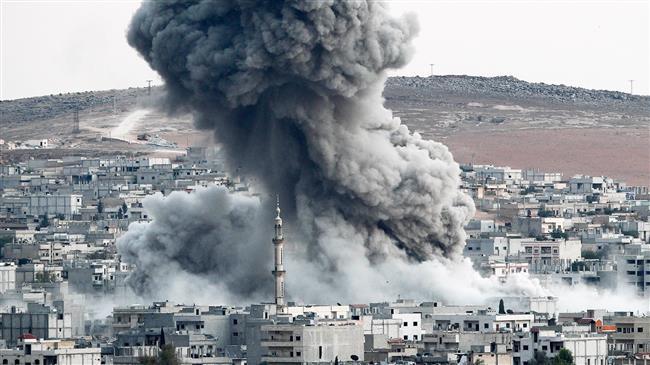
RNA - The US should adopt a grand strategy to withdraw all its troops from the war-torn country – instead of using the issue of chemical weapons as a pretext to carry out an attack against the Syrian army. That’s according to Syrian President Bashar al-Assad.
He says, "The story with chemical weapons is a pretext for a direct military intervention and attacks on the Syrian army. We fully eliminated chemical weapons. We haven’t had them in Syria since 2013."
The truth is, the Syrian government surrendered its stockpile of chemical weapons to a joint mission led by the United Nations and the Organization for the Prohibition of Chemical Weapons, which oversaw the destruction of the weaponry. Washington and its allies are no longer in a position to point the finger at the Syrian government over chemical attacks. Their provocations have nothing to do with reality. This is the result of their imagination and that of the “fakestream” media.
However, despite the defeat of ISIL by the allied forces of Iran, Syria, Russia and Hezbollah, the war-torn country still faces a humanitarian crisis of epic proportions. Millions of Syrian people are still refugees, asylum seekers, internally displaced, or stateless. They are exposed to unnecessary violence from the United States, its regional allies and terror proxies. And still darker clouds loom on the horizon. Food and water shortages, inequality, lack of international aid and reconstruction efforts, terrorism and violence add to the complexity.
Strange enough, the United States, which claims to have a long history of global humanitarian leadership, refuses to change course. Even during the vaunted days of the Obama administration, the US government denied Syrian families their right to asylum and supplied weapons that helped to fuel the conflict in their war-torn country. Now the Trump administration is dragging Syria even further – banning Syrian refugees from traveling to the US, separating parents from their children, boycotting meetings on the Syrian refugee crisis and peace talks, and forcing other countries not to help post-war Syria to rebuild itself.
Under International Humanitarian Law, the United States cannot turn its back on its global humanitarian commitments, and the United Nations must push back against efforts to do so. This is a moral imperative, but it is also a practical one: Peace, security and prosperity in Syria serves vital US interests, not only protecting its own people from the dangers of pandemics or the disruptions of mass refugee movements, but also advancing the vital security interests of its allies in Western Europe.
Rather than continuing along its current path of destruction, violence, military escalation and occupation, the United States needs to embrace a new humanitarian grand strategy - one that allows Syria to rebuild itself and refocuses on troop withdrawal. This new strategy should focus on a set of simple ideas.
First, the US needs a proactive policy for peace. Today, the US-led war on Syria is the primary driver of humanitarian suffering for millions of people. The conflict is draining the Syrian economy, while stoking the nation’s reconstruction pressures. Despite these trends, the US has invested little in peace building and conflict prevention. As one example, the US has even started training new proxy forces for the second round of its regime-change campaign in Syria - while it is poised to lose again.
According to Fars News Agancy, it is time to reverse this destructive foreign policy and wishful thinking, and create an overarching strategy of violence reduction and conflict prevention. Such a strategy would begin with deescalation and troop withdrawal. That’s because the political crisis in Syria can only be resolved through politics and diplomacy. Ending US support for militant proxies and working to negotiate cessation of the conflict under a mandate to restore Syria-wide stability and peace is the only known solution for ending the war.
In parallel, the United Nations needs to dedicate far more resources and diplomacy to the humanitarian-response system, while spending the allocated international funds for reconstruction in more effective ways. This means recognizing that the Syrian government on the front line of the crisis is the best responder. International aid needs to be channeled through the government and local companies. Without involving and empowering the central government and communities at the ground level, no foreign aid will ever be able to address the dynamics of governance and equitable reconstruction and growth in post-war Syria.
847/940